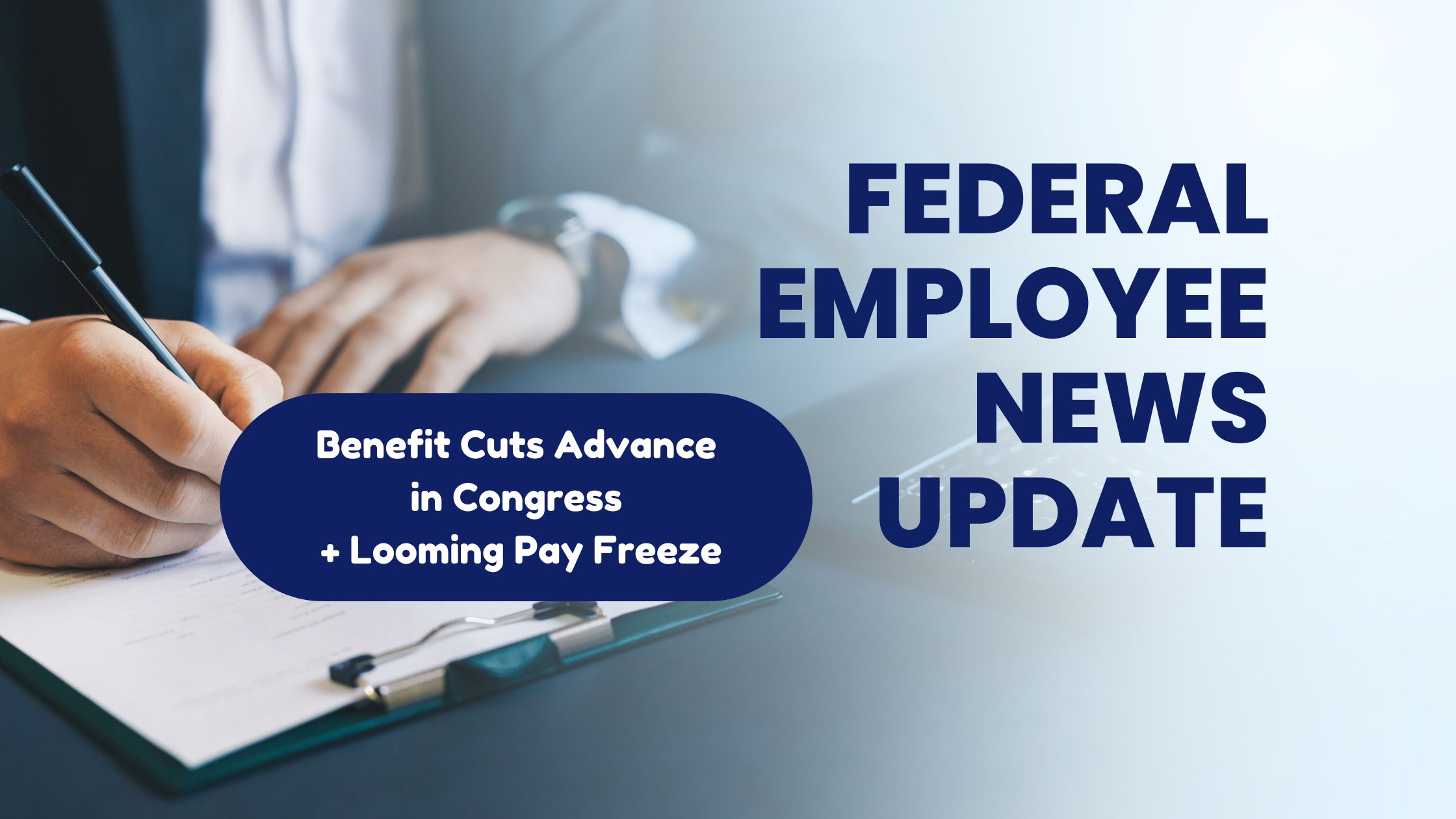Federal employee benefits face potential cuts & a pay freeze in 2026 for federal civilian employees. How House oversight actions impact federal workers and government budget.
Federal Employee Benefits News Update: Pay Freeze and Potential Budget Cuts
The landscape of federal employee benefits is facing significant changes as House Republicans advance plan to cut federal workforce pay and protections. This proposal has sparked widespread concern among federal employees and their families, who rely on these benefits for financial security and stability. Also, the White House recently published a “skinny” federal budget proposal that indicates there might be a federal pay freeze (0% annual raise) for civilian government employees.
2026 Federal Pay Raise, Current Federal Workforce Benefits, and How They Might Change
As explored last week’s article about a 0% federal pay raise in 2026, the White House budget proposal for fiscal year 2026 so far mentions nothing about giving civilian federal workers an annual pay bump, strengthening the possibility of the first federal pay freeze since 2013. Some federal workers might still see a modest pay increase depending on their locality designation and any increase in the cost of living within that area.
Overview of Existing Federal Employees’ Retirement Benefits
Federal employees currently enjoy a comprehensive benefits package that includes health insurance, retirement plans, and various forms of leave. The Federal Employees Health Benefits Program (FEHB) provides a range of health insurance options, while the Federal Employees Retirement System (FERS) offers retirement benefits through a combination of a basic annuity, Social Security, and the Thrift Savings Plan (TSP). Additionally, federal workers have access to the Federal Employees’ Group Life Insurance Program (FEGLI) and can accrue sick leave and annual leave.
Register for a FERS webinar for federal employees and federal retirees!
Potential Changes Proposed by House Republicans
A budget proposal to cut $50 billion in federal spending over 10 years was approved by the Senate and sent to the House committee on oversight and government reform for consideration. House Republicans have since passed a proposal to implement a series of these cuts through a reconciliation bill that aims to reduce federal spending by cutting federal civilian employee benefits. This recently approved plan includes changing the high three years of salary to a high five average, increasing the contribution rate to FERS to 4.4% for all active federal workers, and eliminating the FERS social security supplement for retirees under the age 62. Read this article for more information about proposed cuts to federal employees and retirees benefits package. The one Republican representative on the committee to vote against the proposed cuts, which passed 22-21, believes the proposition will not be approved by Congress as part of any reconciliation measure for federal spending.
Retired Federal Employees Would Still Receive SRS
It is important to note that in the proposed budget cuts for federal workers’ retirement benefits, the special retirement supplement for FERS would only be eliminated for those who applied for retirement after the budget measure was decreed, should it pass. Employees who retire before the proposed law passes, assuming they’re eligible, would still be able to collect the SRS benefit. If you are a federal employee under the age of 62 and thinking about retirement, consider talking with a fed-expert financial planner that can help you decide if retiring before the SRS is eliminated is a wise a decision for your financial situation and retirement plan.
Understanding the Federal Employees Retirement System (FERS)
The Federal Employees Retirement System (FERS) is defined benefit plan (pension) that works in tandem with Social Security, and the Thrift Savings Plan (TSP) – a defined contribution plan like a 401(k). FERS is designed to offer financial stability to retired civil servants, ensuring they have a reliable income stream in retirement. The system encourages federal workers to contribute toward their retirement benefits with the TSP, with either pre-tax or Roth contributions, and ensuring the government matches contributions to the TSP up to 5%.
Estimate your FERS annuity payment with our Federal Retirement Benefit Calculator.
The Role of the House in Federal Employee Pay Decisions and How Pay Freezes Impact the Federal Workforce
House Oversight and Budget Reconciliation Processes
The House Oversight Committee is responsible for reviewing and approving changes to federal employee compensation and retirement benefits. Additionally, the budget reconciliation process allows for expedited consideration of budgetary legislation, enabling the House to implement changes to federal pay and benefits as part of broader fiscal policy objectives.
Comparison with Salary Trends in the Private Sector
In contrast to the federal workforce, the private sector often experiences more dynamic salary trends, with regular raises and bonuses to attract and retain talent. Pay freezes in the federal government can create a disparity between public and private sector compensation, making it challenging for federal agencies to compete for top talent. This disparity can exacerbate recruitment and retention challenges, particularly in specialized fields where private sector salaries are significantly higher.
Long-term Implications for Federal Government Operations
The long-term implications of pay freezes on federal government operations are significant. A demoralized and understaffed workforce can lead to inefficiencies, reduced innovation, and compromised service delivery. As federal agencies struggle to attract and retain skilled employees, the quality of public service may decline, affecting the government’s ability to fulfill its mission effectively. Addressing these challenges requires a balanced approach to compensation that considers both fiscal constraints and the need to maintain a capable and motivated federal workforce.
Reach Out to Us!
If you have additional federal benefit questions, contact our team of CERTIFIED FINANCIAL PLANNER™ (CFP®), Chartered Federal Employee Benefits Consultants (ChFEBC℠), and Accredited Investment Fiduciary (AIF) professionals. At PlanWell, we are federal employee financial advisors with a focus on retirement planning. Learn more about our process designed for the career fed.
Preparing for federal retirement? Check out our scheduled federal retirement workshops. Sign up for our no-cost federal retirement webinars here! Make sure to plan ahead and reserve your seat for our FERS webinar, held every three weeks. Want to have PlanWell host a federal retirement seminar for your agency? Reach out, and we’ll collaborate with HR to arrange an on-site FERS seminar.
Want to fast-track your federal retirement plan? Skip the FERS webinar and start a one-on-one conversation with a ChFEBC today. You can schedule a one-on-one meeting here.










